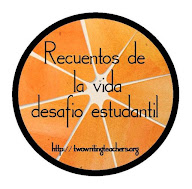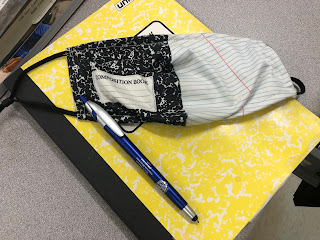PREPS, TEXTS, AND POWERLAUGHS
I have three preps this year, which is Teacherese for three different courses to prepare for. And if you're an English teacher, that's a lot of reading. Not just reading literature. Reading journals, homework, essays, tardy slips, emails, test answers. So we do what we have to do: we get books on tape; we collect journals once or twice; we spot check homework. And we try to keep it fun. So we don't burn out and weep because grammar is dead.
My goal this year is to keep power laughing. Last week I taught the short stories Lamb to the Slaughter, a Roald Dahl story about a woman who kills her husband with a frozen leg of lamb. (I can't even type that without laughing.) Then I taught Kate Chopin's The Story of an Hour, the story of a woman who learns of her husband's death in a railroad accident and collapses, alone, beset by grief in her room. But then (*symbolism alert - I trigger these alerts with a very loud trumpet noise I have worked on my whole life) she gazes out the window at the beautiful spring sky (ahem, rebirth) and is overcome with a renewed sense of freedom.
So, yes, it's a feminist story and a damn good one. The language is challenging. The imagery is beautiful. And it has a great ironic ending. Any kid loves a good twist at the end.
After Mrs. Mallard has celebrated her new found freedom, her husband walks in. It was a mistake. He's alive! And Mrs. Mallard drops dead of "the monstrous joy that kills." Ha!
(I still think there's some significance in her name, too. A mallard is a duck, right? There's gotta be something there.)
We finish our group analysis and I hit them with an individual writing assignment. One of my students raises his hand and asks, "Mrs. Jepsen, is your husband going to be OK this weekend?" I was belly laughing! I had these kids read two stories about wives so clearly not happy in their marriages - and this kid was so clever, so funny, so witty.
You'd think that fifteen-year -old kids wouldn't relate with feminist themes of marriage, but they do. Their end of the week journals echoed the same kind of reflection: they liked the stories we read.
Now for my "other" content.
Siddhartha.
The Glass Castle.
A tad on the heavy side. These texts don't lend themselves to power laughing.
My point? I have three very different texts happening in my day. I start with The Glass Castle in Creative Writing. We are reading with the purpose of exploring the craft of memoir. How and why does Jeanette Walls share her memories of growing up in poverty? It's such a great way to approach a book. To really celebrate a writer's craft is a blast, even if the themes are sad.
The end of my day, my honors class, when I need to pee like SeaBiscuit and can't string a sentence together, we explore much different ideas, like, oh I don't know . . . what's the meaning of life? What is salvation? What is our purpose on earth? Will Siddhartha achieve enlightenment?
Good gravy. Today I was trying to hang in there and fire as many neurons as I could to lead a meaningful discussion on these whoppers, but I was hanging by a thread. My water bottle was empty. There was one cold swig of coffee left in my mug from 7 in the morning. My eyes were tired.
What's the meaning of life?
Is there a worksheet for that?
My goal this year is to keep power laughing. Last week I taught the short stories Lamb to the Slaughter, a Roald Dahl story about a woman who kills her husband with a frozen leg of lamb. (I can't even type that without laughing.) Then I taught Kate Chopin's The Story of an Hour, the story of a woman who learns of her husband's death in a railroad accident and collapses, alone, beset by grief in her room. But then (*symbolism alert - I trigger these alerts with a very loud trumpet noise I have worked on my whole life) she gazes out the window at the beautiful spring sky (ahem, rebirth) and is overcome with a renewed sense of freedom.
So, yes, it's a feminist story and a damn good one. The language is challenging. The imagery is beautiful. And it has a great ironic ending. Any kid loves a good twist at the end.
After Mrs. Mallard has celebrated her new found freedom, her husband walks in. It was a mistake. He's alive! And Mrs. Mallard drops dead of "the monstrous joy that kills." Ha!
(I still think there's some significance in her name, too. A mallard is a duck, right? There's gotta be something there.)
We finish our group analysis and I hit them with an individual writing assignment. One of my students raises his hand and asks, "Mrs. Jepsen, is your husband going to be OK this weekend?" I was belly laughing! I had these kids read two stories about wives so clearly not happy in their marriages - and this kid was so clever, so funny, so witty.
You'd think that fifteen-year -old kids wouldn't relate with feminist themes of marriage, but they do. Their end of the week journals echoed the same kind of reflection: they liked the stories we read.
Now for my "other" content.
Siddhartha.
The Glass Castle.
A tad on the heavy side. These texts don't lend themselves to power laughing.
My point? I have three very different texts happening in my day. I start with The Glass Castle in Creative Writing. We are reading with the purpose of exploring the craft of memoir. How and why does Jeanette Walls share her memories of growing up in poverty? It's such a great way to approach a book. To really celebrate a writer's craft is a blast, even if the themes are sad.
The end of my day, my honors class, when I need to pee like SeaBiscuit and can't string a sentence together, we explore much different ideas, like, oh I don't know . . . what's the meaning of life? What is salvation? What is our purpose on earth? Will Siddhartha achieve enlightenment?
Good gravy. Today I was trying to hang in there and fire as many neurons as I could to lead a meaningful discussion on these whoppers, but I was hanging by a thread. My water bottle was empty. There was one cold swig of coffee left in my mug from 7 in the morning. My eyes were tired.
What's the meaning of life?
Is there a worksheet for that?


Comments